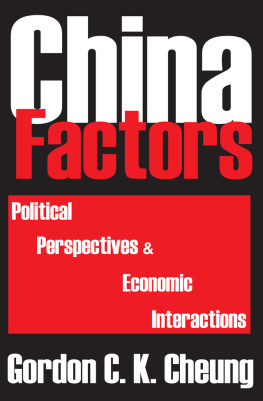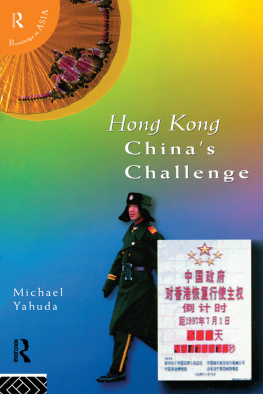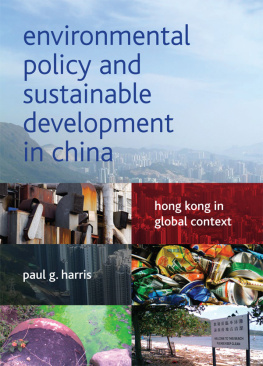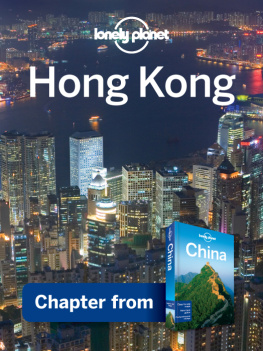First published 2007 by Transaction Publishers
Published 2017 by Routledge
2 Park Square, Milton Park, Abingdon, Oxon OX14 4RN
711 Third Avenue, New York, NY 10017, USA
Routledge is an imprint of the Taylor & Francis Group, an informa business
Copyright 2007 by Taylor & Francis.
All rights reserved. No part of this book may be reprinted or reproduced or utilised in any form or by any electronic, mechanical, or other means, now known or hereafter invented, including photocopying and recording, or in any information storage or retrieval system, without permission in writing from the publishers.
Notice:
Product or corporate names may be trademarks or registered trademarks, and are used only for identification and explanation without intent to infringe.
Library of Congress Catalog Number: 200604066
Library of Congress Cataloging-in-Publication Data
China factors : political perspectives and economic interactions / Gordon C. K. Cheung.
p. cm.
Includes bibliographical references and index.
ISBN 0-7658-0342-9 (alk. paper)
1. ChinaForeign economic relationsTaiwan. 2. TaiwanForeign economic relationsChina. 3. ChinaEconomic conditions2000- 4. Hong Kong (China)Economic conditions21st century. 5. ChinaForeign relationsTaiwan. 6. TaiwanForeign relationsChina. 7. ChinaPolitics and government2002- 8. Hong Kong (China)Politics and government1997-I. Title.
HF1604.C39 2006
337.5105124'9dc22
2006040466
ISBN 13: 978-0-7658-0342-9 (hbk)
This book brings together some of my initial observations, personal encounters, interviews, and experiences on the political economy of Greater China (China, Taiwan, and Hong Kong) especially after 1997 when both the changeover of Hong Kong took place as well as when the Asian financial crisis began. From 1997 to 2002, when I was working in Hong Kong as lecturer and researcher, I benefited from being able to witness those subtle changes in the political and socioeconomic structures in Hong Kong following the changeover. The clear and present influence of China on Hong Kong and Taiwan was enormous. Nevertheless, the present framework was first derived in a paper written in 2004 for an international conference held in Brussels through the Asia-Link Project organized by the Center for Contemporary Chinese Studies at the University of Durham, Renmin University, Beijing and Free University of Brussels.
This book tentatively attempts to show that the catchphrase the rise of China has developed factors which generate political, social, and economic relations within Greater China: China, Hong Kong and Taiwan. Those factors are integration, interdependence, identity, and independence, the four Is. Individually, each dimension can serve as a point of departure to spur a new direction in the ever-changing political economy of the region. It is not that China, the biggest and the fastest growing country in the region should be paid particular attention, but that many factors, such as Cross Strait relations, Hong Kong, and Macaus reversion are creating a cluster of interactions within the region. Politically, these China factors create challenges for traditional bilateral and multilateral relations. Conceptually, the China factors allow one to further investigate whether there are emerging Chinese interactions that may influence regional affairs. The end of the Cold War and September 11 created mixed relations in the governance of the East Asian region. Provided the ability and the willingness of the American political and economic influence in East Asia are unchanged, the concern about new terrorist threats naturally and materially has drawn most of the U.S.s attention toward the domestic security. The examination of these China factors is meant to help shed light on the evolving relations as well as to re-examine a way of viewing governance in that region.
I would like to thank the following persons for their comments during the course of the writing process: Brian Bridges, Chang Chak Yan, Day Dong-ching, Feng Zhongping, Gustaaf Geeraerts, Mads H. Jensen, David Kerr, Peter H. Koehn, Lai Hongyi, Lam Peng Er, Peter N. S. Lee, Liselotte Odgaard, John Ravenhill, Shih Chih-yu, Song Xinning, Elspeth Thomson, Sarah Tong, Wang Zhengxu, Richard Wilson, Wu Guoguang, Wu Yanrui, and Peter Kien-hong Yu. I would especially like to thank William A. Callahan and Gerald Chantheir comments were very important for my revision. I would like to thank Richard Broadbent, Pete Criddle, Li Jiaoyang, Phoebe Lok, and Nicholas Plosser for their help and research assistance. I especially want to say thank you to Irving L. Horowitz and Mary Curtis, the anonymous reviewer and the many other colleagues of Transaction Publishers, especially Larry Mintz and Cheryl Orson for copy-editing. Their continuous support, comments, and encouragement really enabled me to finish the book even though the manuscript has been delayed several times. I would further like to thank Mr Wong Sek Wah of the Tsung Tsin Association in Hong Kong which offered many opportunities for me to go to Taiwan to visit many government organizations such as the Education Department, the Mainland Affairs Council, the mayors office in Taipei, and the presidents office. I also thank Professor Song Xinning at Renmin University in Beijing for inviting me as a Visiting Professor in the end of 2004 as well as Professor Wang Gungwu and Professor John Wong from the East Asian Institute at the National University of Singapore where I was invited as the Visiting Research Fellow during the summer of 2005 in order to track down some elusive resources for the book. Finally, I wish to thank Dr. Steve Tsang who sponsored me when I was elected to Senior Associate Membership during the Michaelmas term of 2005 in St. Antonys College at the University of Oxford where I finalized the book.
I would also like to thank the University Services Centre at the Chinese University of Hong Kong, Lingnan University in Hong Kong, Renmin University in Beijing, the library of Law and Social Sciences at the National Taiwan University, the library at the University of Durham in the United Kingdom, the East Asian Institute Library at the National University of Singapore, the main library at St. Antonys College, and the Vere Harmsworth Library at the University of Oxford. The libraries of these universities all contributed one way or another to the data collection and theoretical development as well as my writing process for this book. I would further like to thank the Centre for Contemporary Chinese Studies of the University of Durham, the European Commission, Lee Foundation in Singapore, National Chung Chin University in Taiwan, Ming Chuan University, and the Universities China Committee in London for their financial support in allowing me to participate in different conferences where ideas and exchanges were evolved and incorporated into this book. Thanks are also due to many colleagues, scholars, politicians, and other individuals who spent their time in educating me first appeared in an article APEC as a Regime for Taiwans Interdependence with the United States and Mainland China, in Issues and Studies , Vol. 33, No. 2 (February 1997): 21-39. I am grateful for the publishers permission to reproduce it here.
Finally, I would like to thank my mother, my wife Flora, and my two kids, Jenna and Edmund. They have always been my spiritual support.









